- Home
- Laura Resnick
The White Dragon
The White Dragon Read online
Praise for...
The White Dragon
The Silerian Trilogy: Book Two
"Year's Best" list, Publisher's Weekly
"Year's Best" list, Voya
Best Epic Fantasy, Romantic Times Magazine
"Even better than the author's first book... this romantic fantasy leaves no doubt that here is that rare gem: a new writer with a serious and already-polished talent. Resnick builds her tale on a solid foundation of consistent mythology and magic, well-rounded characters, and a collection of completely believable cultures... A suspenseful mix of vague prophecies, startling revelations, constantly shifting loyalties, and the occasional divine intervention, this stunning novel tantalizes right up to the last cliffhanger page."
—[starred review] Publisher's Weekly
"Vivid descriptions, three-dimensional characters, and a story filled with echoes of a distant past make this a stand-out addition to a fantasy series that belongs in most libraries. Highly recommended."
—Library Journal
"We are drawn ever deeper into her complex and interesting created world... There's violence and humor and mystery and surprises and plenty of action..."
—SF Chronicle
"Resnick has complete control of her craft. Not a word is wasted. Still, it's not a light read. The characters are complicated and real. There are plenty of twists and surprises, and the pace quickens as you go. Resnick's world is dangerous and exciting, yet it has a history and many hidden facets."
—Cincinnati Enquirer
"Atmospheric world-building, dry humor, and appealing characters make The White Dragon an epic fantasy not to be missed. New readers should check out the earlier book in the series, In Legend Born, for backstory, but this novel stands on its own as an enthralling fantasy adventure." —Romantic Times
The White Dragon
The Silerian Trilogy: Book Two
by Laura Resnick
www.LauraResnick.com
Copyright
The White Dragon
Copyright © 2003 & 2011 by Laura Resnick
ISBN: 978-1-61475-880-8
Ebook published by Blonde Trifecta
Maps by Elizabeth Person
This is a work of fiction. Names, characters, places, and incidents are either the product of the author's imagination or are used fictitiously. Any resemblance to actual persons, living or dead, events, or locales is entirely coincidental.
The copying, reproduction, and distribution of this ebook via any means without permission of the author is illegal and punishable by law. Please purchase only authorized electronic editions and refuse to participate in or encourage the electronic piracy of copyrighted materials. Your support of the author's intellectual property rights is greatly appreciated.
To the memory of Aunt Sima—
to know her was to adore her
And to my cousin Julie,
who loaned me Kiloran's name
Foreword to the E-Book Edition of
The White Dragon
The Silerian Trilogy: Book Two
This ebook contains some extra features which were not in the original hardcover and paperback editions of The White Dragon.
First and foremost are the color maps, which I commissioned from my friend Elizabeth Person. If you have a black-and-white e-reader and would like to see the color versions, or if you'd just like to see a larger image of the maps and some additional information about them, they're posted on my website.
There's also a Glossary of various terms created for the world of the novel, as well as directories of Characters, Clans, Factions, and Place Names.
The White Dragon has been out of print for a few years, and I am delighted to be able to make it available again. I hope you enjoy this novel—as well as the conclusion of this trilogy, The Destroyer Goddess, and the first book in the story, In Legend Born.
—Laura Resnick
Prologue
Dar, the destroyer goddess, chose
Sileria as her home. Fortunately, we
are not so easy to destroy.
—Silerian Proverb
The vast island nation of Sileria rose majestically out of the azure waters of the Middle Sea. Surrounded by mainland empires which arose and fell as the eons passed, Sileria had suffered invasion and conquest many times. She was a great prize, since possession of Sileria was necessary for domination of the Middle Sea, once named Sirkara—heart of the world—by an ancient people whose forgotten empire had been the first of many to rise in glory and descend in flames. This inland ocean was bordered by the vast Moorlands, the sprawling Empire of Valdania, the ancient Kintish Kingdoms, and the delta created by the north-flowing Sirinakara River.
For a thousand years, the island nation of fertile fields, rich mines, harsh mountains, and bustling ports had endured foreign domination as one conquering power after another claimed Sileria, the sun-drenched jewel of the Middle Sea, for itself. For a thousand years, her disparate peoples had suffered humiliation, servitude, and contempt. For a thousand years, Silerians had looked to Dar, the most powerful goddess in a nation of many sects and cults, to liberate them from the yoke of slavery.
The goddess's home was the sacred volcano of Mount Darshon, whose snow-capped, cloud-piercing peak dwarfed the rest of this rugged, mountainous land. In the center of Darshon's caldera was the seething, bubbling lake of molten lava wherein dwelled Dar, goddess of fire and of the Otherworld. Forged from a union of earth and sky, Dar had traveled the three corners of the world in search of a home before finally coming to rest at Darshon, the mightiest of mountains in the most beautiful of nations.
She was the destroyer goddess, wiping out whole villages on a whim, exploding in showers of lava and molten rock which set the surrounding mountains on fire and blackened the sky with ash. Her fiery nature had shaped Her people, making them ruthless, unforgiving, and violent. Yet it was also Dar who had made them the strongest, fiercest, and bravest people in the world.
She was a creator, too, renewing the tired earth again and again, enriching the lowlands, leaving fertile fields in the wake of Her tempestuous fury. Without Dar, the harvests would be perpetually poor, the mines would be barren, and Sileria's people would be bereft of the Otherworld.
Without Dar, Silerians would still be hopeless slaves of the Valdani. It was Dar who had given Her people Josarian the Firebringer, the prophesied warrior who united all Silerians for the first time in a thousand years and led the Silerian rebellion against Valdania.
Silerians were a profoundly devout people, and so, even in the face of foreign laws prohibiting their native religious practices, they had never neglected Dar or failed to thank Her for these blessings. The zanareen, fanatics once considered insane by most Silerians, had worshipped at the rim of Darshon's fierce volcano for centuries, and many had died flinging themselves into the Fires of Dar in hopes of becoming the Firebringer. After Dar chose Josarian as the Firebringer, the zanareen served Her by serving him.
The city-dwellers, the lowlanders, and the earth magic cult of the Sisterhood made offerings to Dar of flowers, fruit, wine, and grain. The toreni, Sileria's landed aristocrats, made Her rich offerings of livestock, even of gold and jewels. The shallaheen—the mountain peasants who were Sileria's poorest and most numerous people—worshipped Her even more devoutly than the others and offered their very blood to Her, slicing open their palms to swear bloodpacts and bloodfeuds as they chanted their prayers to Dar. They made pilgrimages from all over Sileria, coming to Darshon to offer the bones of their dead to the goddess.
The Guardians of the Otherworld were closest of all to Dar, for She had blessed them with fire magic and with the ability to commune with shades of the dead sojourning in the Otherworld. For centuries the Guardians
had devoted every day of their lives to Dar even though their kind had been outlawed by the Valdani for two hundred years—and sought by the deadly waterlords and assassins of the Honored Society for far longer than that.
Yes, despite the bloodfeuds which destroyed whole clans and the fanaticism for which various sects killed and died, despite the terrible poverty of the shallaheen and the mixed blood of so many toreni and city-dwellers, despite centuries of foreign domination and exposure to foreign gods... Despite all this, most of Sileria's people still remembered to pay their respects to the fierce goddess who dwelled in the fiery heart of Mount Darshon.
It was not enough.
Deep in the heart of Darshon's raging, fire-spewing sea of lava, Dar rumbled with discontent and claimed the right of a goddess to demand more from a people who, She knew, would now need more from Her.
Chapter One
When the last dragonfish is dead,
then will I set my foot upon land.
—Motto of the Lascari Clan
The deck of the fishing boat rolled beneath Zarien's feet, rocking and soothing him as it had every day of his life, since the moment he'd been hauled of out of the sea where he had been born. For as long as Sileria's sea-born folk had existed, their women had given birth to their generations in sacred coves, then midwives blessed the infants with ritual immersions before passing them to waiting paternal arms aboard nearby boats. It had now been some fourteen years since the midwife had held Zarien underwater to introduce his spirit to the spirit of the dragonfish, whom his people feared, fought, and must someday vanquish.
And for fourteen years, Zarien had lived by the creed which bound his clan, the Lascari—and many other sea-born clans—to life upon the waves: He had not set foot on land, not once in his life.
True, many sea-born folk did walk among the landfolk of Sileria. They traded on shore and supplied the floating markets upon which sea-bound clans like the Lascari relied for those things that the sea did not provide. They met with smugglers, rebels, and outlaws on land. They personally delivered cargoes, carried from the nations surrounding the Middle Sea, to wealthy merchants, aristocrats, and waterlords. Some had even marched inland to meet the Firebringer himself, Josarian, to pledge the many clans of Sileria's sea-born folk to his cause.
But the Lascari did not walk the dryland, nor would they until the last dragonfish in the Middle Sea was finally dead. Since before memory began, since before there had been waterlords in Sileria or the Palace of Heaven in Kinto, since before the empire of the Moorlanders had risen from the mists or disappeared centuries later into ashes, since before the Valdani had built the great city of Valda and struck out to conquer so much of the world, including Sileria... Since before all this, the sea-bound Lascari had thrived without going ashore; indeed, to do so ensured banishment from the clan. Theirs was a proud and ancient tradition, one to which they clung fiercely. Zarien had been taught not to rudely ridicule clans who mingled with the untattooed landfolk or who profaned their sea-born heritage by treading on solid ground while yet a dragonfish lived, but he was proud to be coming to manhood in a clan that did not do such unworthy things.
During the Festival of the New Year this year, he had received the tattoos of adulthood, as had all other sea-born children born fourteen years earlier, in the Year of Dark Skies. The intricate indigo markings he now bore on his hands, face, and forearms forever marked him as sea-born, as Lascari, and as a man. But only now might he become a man in truth; if he presented his mother with the heart of his very first dragonfish kill, then he would earn the right to say to her, as generations of sea-born males before him had said to their mothers, "Today I am a man."
They called it Bharata Ma-al in sea-born dialect: the Time of Slaughter. Now, as spring ripened into its full promise in Sileria, the dragonfish swam close to shore to lay their eggs in warm coastal waters. Now they were vulnerable. Now the sea-born showed them no mercy.
The rest of the year, these ferocious creatures might strike the sea-born folk anytime, anywhere in the Middle Sea. Many a boat had never returned from the open sea, many a man had died in those voracious jaws. No one—not marauding Moorlanders, not Kintish pirates, not the Valdani themselves with their sleek warships—had ever killed as many sea-born folk as the dragonfish had. Zarien's people had faced and fought this enemy since they first took to the sea, and until they had spilled the dark purple blood of the very last one left alive, there could be no peace. Only then would their destiny be complete. Only then might the children of their children's children set their feet upon land.
Zarien shrugged and lifted his face to the wind, indifferent to the knowledge that he would never walk the dryland. Why would anyone want to? The sea was the only life for real men, the dragonfish the only enemy worth facing. Let the shallaheen, Sileria's mountain peasants, slaughter each other in their endless bloodfeuds. Let the assassins of the Honored Society kill and be killed in bloodvows which were sworn to serve the power struggles of their masters, the waterlords. Let the vast armies of the world's rising and falling empires grapple for supremacy on the mainland all around the Middle Sea. What concern was any of this to the Lascari and their kind, whose enemy had been chosen for them by their gods at the dawn of time?
The sturdy two-masted boat upon which Zarien's family lived drew near the ancient killing grounds of the Lascari, the stretch of coastal waters which they had claimed as their own centuries ago. Zarien's heart began thudding with mingled pride, fear, and excitement. Tonight, for the first time, he would join the men of his clan in the bloody ritual through which they honored their gods and proved their manhood by facing the dragonfish. It was during the Time of Slaughter that, for once, the sea-born folk rather than the dragonfish staged the ambush, chose the time and place of the confrontation, and challenged the enemy rather than simply awaiting their unpredictable attacks.
By the time the bharata was over, the shores of Sileria would be stained with blood and the sea would be dark with it. Not all of it would be purple either. Bharata Ma-al claimed many sea-born lives, too, every year.
The season of slaughter was a short one, lasting only while the first new moon glowed alone, before the second one appeared to join it in the night sky, during the fourth month of the year. It was a sacred span of three days and nights, an opportunity which came only once a year. If Zarien did not slay a dragonfish during the bharata, the traditional time for a first kill, then he would have to rely on chance until next year, on the mingled hope and fear that a dragonfish would attack him somewhere in the open sea. And until he finally killed one, he would be excluded from the rights and privileges granted only to those who had done so. He would also, he reflected sourly, be obliged to listen meekly to the other men's endless boasts wherever boats met and mingled at sea or in Sileria's harbors.
"Stop scowling," his mother advised him, brushing past him as she prepared the deck to receive the first dragonfish corpse of the bharata.
"I wasn't scowling," he said. "I was thinking."
"You were thinking?" Her dark brows rose. "Ah, for that alone, we should hold a special festival."
He scowled at her but didn't retort. A sea-born man who was not respectful to women—especially to his mother—would be dragonfish bait before long.
He didn't help her with her work, nor did she ask him to. Work was strictly divided among the sea-born, and each person stayed out of the other's way when it came to chores and duties. Boats were small and unsteady, after all, and the sea-born couldn't afford to trip over and bump into each other all the time like clumsy landfolk. So Zarien stayed out of his mother's way and attended to his own work—which currently meant trimming the foresail as the boat drew near the killing waters.
Some of the boats of the Lascari clan were already there, and others were arriving even as Zarien's family brailed their sails up to the yard and prepared to drop anchor, positioning their boat for the setting of the nets. The women of each family had folded the huge nets aboard their own boats wi
th care so that they would feed out smoothly and quickly when they were being set.
Only let this slaughter make me a man, he prayed to the spirits that ruled the sea. Without his manhood, he would not be allowed to carry the stahra he knew his parents had already acquired for him and tried to hide below deck without his knowledge. Among the sea-born, the stahra was a deadly weapon with which a sea-born man protected himself and his family from enemies, pirates, landfolk, and dragonfish. To ignorant eyes, though, it simply looked like an oar, something which even the Valdani didn't object to Silerians possessing.
Of course, the need to conceal weaponry from the Valdani was changing with the coming of Josarian the Firebringer. A simple shallah turned rebel leader, Josarian had proven himself to be the long-prophesied chosen one of Dar, the destroyer goddess who dwelled in the volcano of Mount Darshon. With few exceptions, all of Sileria's disparate population worshipped Dar. The Honored Society, of course, was one of the exceptions. They had turned their backs on Dar a thousand years ago, during the time of Marjan, the very first waterlord, who had founded the Society. But even the Society—like the sea-born folk—were not openly disrespectful of Dar. After all, Zarien knew, to worship a land goddess like some mountain peasant was one thing, but to openly insult Her and risk Her vengeance was quite another.
Sileria and all her peoples had toiled under the rule of various foreign nations for a thousand years, since the days of the Conquest when the Moorlanders had sailed out of their misty western homeland in search of slaves and gold. After them came the Kints, founders of the ancient union of exotic kingdoms east of the Middle Sea; they had ruled here for six hundred years. Two centuries ago, they had lost Sileria to the Valdani, builders of the most powerful empire the Middle Sea had ever known.

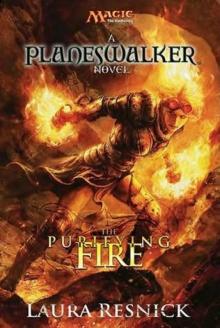 The Purifying Fire p-2
The Purifying Fire p-2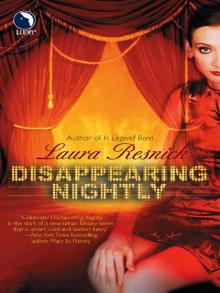 Disappearing Nightly
Disappearing Nightly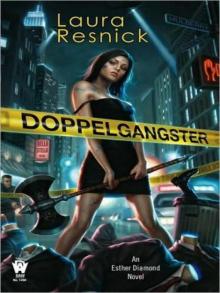 Doppelgangster
Doppelgangster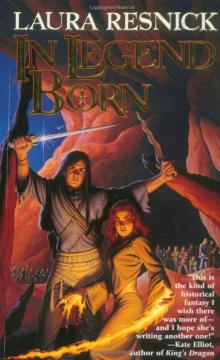 In Legend Born
In Legend Born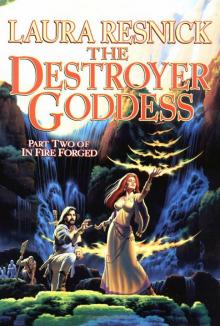 The Destroyer Goddess
The Destroyer Goddess The Purifying Fire: A Planeswalker Novel
The Purifying Fire: A Planeswalker Novel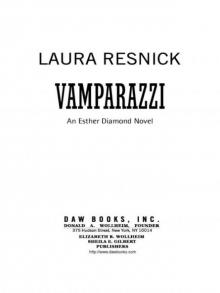 Vamparazzi
Vamparazzi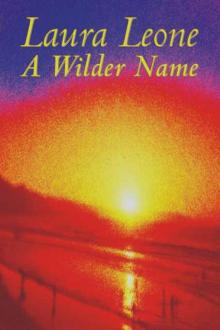 A Wilder Name
A Wilder Name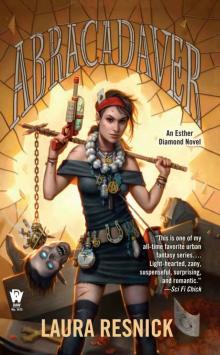 Abracadaver (Esther Diamond Novel)
Abracadaver (Esther Diamond Novel)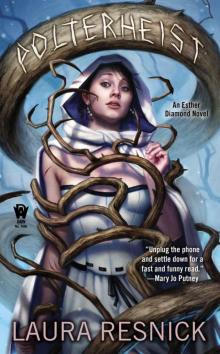 Polterheist: An Esther Diamond Novel
Polterheist: An Esther Diamond Novel The Misfortune Cookie ed-6
The Misfortune Cookie ed-6 Fever Dreams
Fever Dreams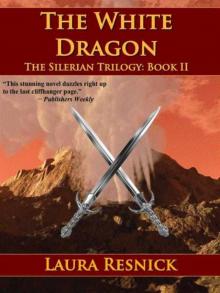 The White Dragon
The White Dragon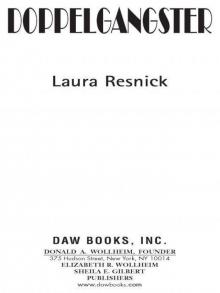 Dopplegangster
Dopplegangster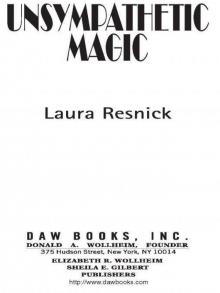 Unsympathetic Magic
Unsympathetic Magic